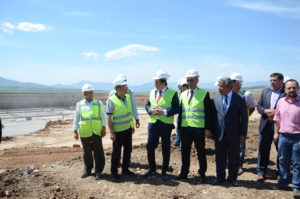
Technical Assistance for Implementation of Civil Society Dialogue and Civil Society Support Programmes (TR2015/DG/01/A5-01/001)
The overall aim of the project is to increase bilateral exchanges and cooperation between CSOs in Turkey and the EU at local, regional and national levels, to promote awareness raising initiatives on importance and benefits of membership of Turkey to the EU within Turkey and EU and on

Technical Assistance for Implementation of Human Resources Development Operational Programme (HRD OP 5.1)
There was a need regarding the implementation of the HRD OP for improving the coordination and control of HRD OP, and by assisting the Operating Structure and relevant institutions in the different programming, monitoring, evaluation and implementing tasks. Within this context of the project, the components were aiming

Technical Assistance and Supervision for Kahramanmaraş Water and Wastewater Project
The quality of the drinking water and its consumption is one of the most critical topics for the European Union and the whole world. Based on this context, the programme aimed to accelerate Turkey’s accession to the EU by enabling Turkey to achieve a high level of environmental

Training for the Institutional Capacity Building on Climate Change Adaptation
The overall objective of the project is to improve climate change adaptation knowledge and the capacity of the Staff of Turkish institutions (members of CBCCAM (Climate Change and Air Management Coordination Board) for implementation of adaptation policies and projects.

Ministry of Development Training Programme
Organisations need technical assistance with funds and areas like good management practices; monitoring reports; training programmes on monitoring and evaluation; objectives and indicators, etc. Therefore, the project aimed to provide technical assistance to the Ministry in the field of fund management to the Standing Committee for Economic and

Strengthening Vocational Qualifications Authority (VQA) and National Qualifications System (NQS) in Turkey
It can be claimed that the labour markets are required to ensure the provision of formal and non-formal education and training, to support life-long learning, strengthening the relationship between education and employment, and facilitating harmonization with the European Qualifications Framework (EQF). Within this scope, the project aimed to

